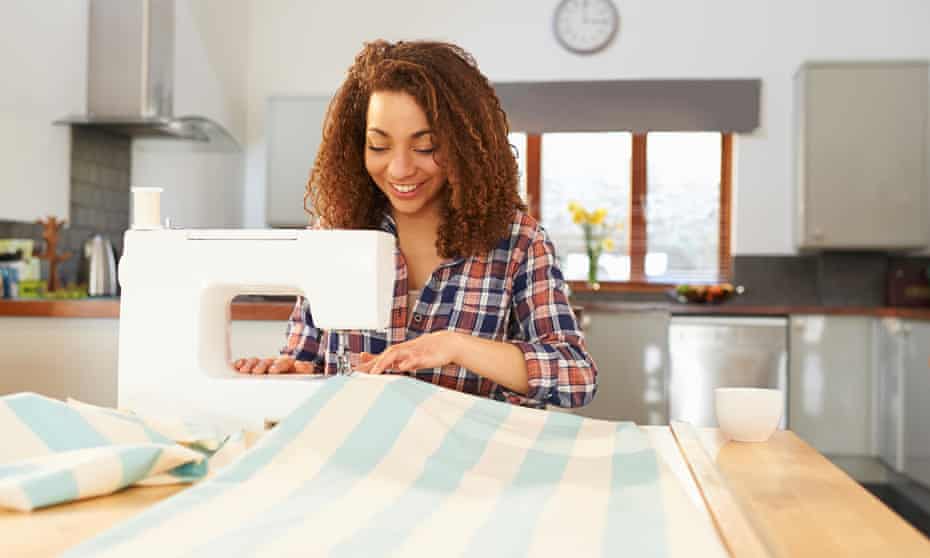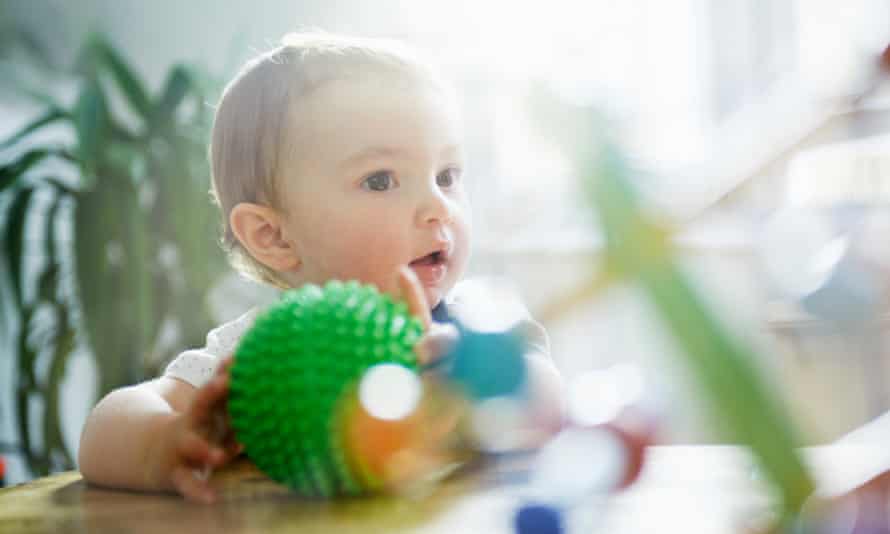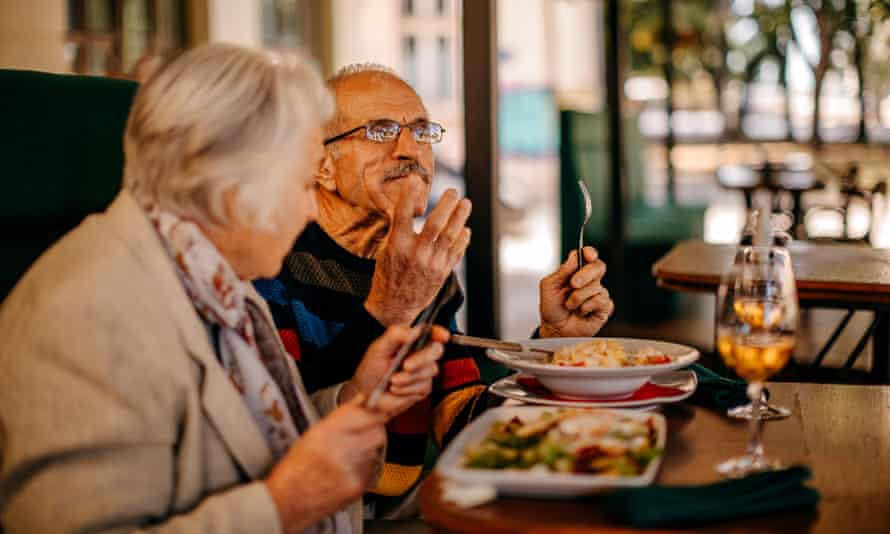Down with Black Friday! Seven readers on how they turned their backs on consumerism
As the annual Christmas shopping frenzy begins, readers discuss how they have challenged this culture – from sewing to buying secondhand to instituting a ’90 day rule’

With Black Friday marking the start of a frantic month of Christmas shopping, we asked our readers to get in touch about the ways they have challenged consumerism.
Responses ranged from revolutionary changes such as giving up buying new clothes to subtler tweaks such as making sandwiches rather than buying a plastic-encased meal deal. Everyone agreed, however, that turning their back on a culture that constantly demands more from consumers came with financial and environmental benefits, not to mention a feeling of smug satisfaction that money simply can’t buy.
Furnish your home for free
Earlier this year, I bought an old house with my partner. It was unfurnished and needed considerable work, including a new kitchen and a new bathroom. For many, it would have been tempting to go to Ikea and furnish the house in one day. Not for us – we weren’t comfortable with filling our new home with stuff that’s going to be in landfill in a few years. Besides, why buy new when the world is saturated with quirky used furniture?
We decided to challenge consumerism by getting it all free from Gumtree and Facebook Marketplace. Time and time again, we’ve been surprised by people’s generosity: we got a practically new TV stand from our neighbours and an unwanted solid-wood kitchen completely free. We dismantled it and adapted it for our kitchen; we were complete beginners but we’ve managed to tackle all the building work and plastering ourselves and it feels good knowing that we’ve saved so many items that otherwise would have ended up in a skip.
I think everyone should ask themselves if they really need that new item, or if it’s an opportunity to be creative and give a beautiful object a second chance. Furnishing our house this way has been a win for our self-esteem, wallets and the planet. Nicola Parisi, 36, Manchester
Spoil your new baby with secondhand treats

We had a baby in June and have managed not to buy anything new: almost all her clothes are at least secondhand. We’re determined not to end up with a house full of horrible plastic that gets used once and forgotten about, so we got all her toys, often for free, from Facebook Marketplace. We recently bought her a toy subscription from Whirli, too. The toys are great and once she’s done with them, they get sent back and replaced with something different.
People can be so generous, particularly with baby things, and it feels really nice to be able to do the same. We’ve already given away her 0-3 months clothes and we’re looking forward to donating her 3-6 months wardrobe soon.
Plenty of people struggle to pay for all the things their young child needs. You can give almost anything away – someone, somewhere will want it. Sam Hopes, 33, Lancaster
Give unwanted hardware a loving home

I’m an animator so I use high-end computers and graphics cards for my job. I had to upgrade everything over lockdown, and really wasn’t comfortable chucking perfectly serviceable components into a skip. My mother is 83 and only really needs the icon that fires up the internet so she can get on email and Zoom (which she’s got massively into in the past couple of years). She is happy with the free stuff, and when the components finally hit the recycle dump they will have been in service for up to 15 years.
Handing down my old computers has taught me a lot about how wrapped up in perception a lot of consumerism actually is. People are sold a phantom when it comes to technology. Companies do a great job of making people crave the latest shiny metal casing when, most of the time, the components inside are fairly generic and probably not even made by the same brand you think you’re buying. Andy, 48, London
Learn to sew
I was a big shopper when I was young, spending my student loan in the fresher sales, but when the pandemic hit I thought it would be a great time to learn to sew. I was lucky that my mum and grandmother have always sewn, so there was a spare machine lying around. But you can get a perfectly good one for GBP50 on eBay. Fabric and clothes to change/alter are inexpensive if you’re thrifty. YouTube is your best friend: there’s a video for every skill and every problem you have to solve.
Not only is it a great way to safely pass the time in lockdowns, but it has made shopping in charity shops so much easier, knowing I can alter clothes so they feel tailor-made to my size and style. I used to get so frustrated seeing things that I liked the look of but didn’t quite work. Now I can do things like turn a pair of old trousers into a tote bag or turn a large men’s shirt into two new ones my size.
I’m even fixing things for my housemates and making presents for people they love and appreciate. It just means more to people when they can see you’ve spent time making something specific to them as opposed to just buying it. Ellie Bromwich, 26, London
Follow the “90-day rule”
In 2014, I set myself a challenge. Could I go the whole year without buying anything new or secondhand? It was tough but after 13 weeks, I broke my lifelong shopping addiction and I really enjoyed being mindful about my purchases. Saving a staggering 38% of my salary was a nice bonus, too!
Of course, I couldn’t not buy anything for ever but now, before I click “add to cart” on Amazon, I pause and add the item to my “90-day wishlist”. It’s occasionally agonising having to wait but nine times out of 10, I end up thinking: “Nah, I don’t really want that after all.”
Beyond helping me become debt-free, the rule has made me happier. I used to spend my Saturdays traipsing round department stores; now I’m focused on my passions, like walking my dog on the beach or arts and crafts. These experiences are so much more satisfying than looking around to see my flat full of shiny belongings. I am thriving, not just surviving. Rachel Smith, 40, Kent
Don’t buy any new clothes
I was feeling hopeless about climate change when I stumbled across an article encouraging readers to participate in the No New Clothes movement. I was already doing the basics: I recycle, I walk or use public transport, I’m vegetarian, I use reusable period pants. I felt I was running low on individual actions I could take. Tackling my consumerism felt like the next logical step and, in June, I ditched fast fashion.
I now think much more intentionally about clothing. Do I really need another new dress to wear to a wedding? What’s the point of buying something to wear only once when no one’s really paying attention anyway?
I wasn’t insane with my spending before, but probably a few times a year I would head into town to get a new pair of jeans and end up coming home with GBP150-GBP200 of stuff I would only wear a handful of times. The pandemic made it easier to get out of the habit.
Committing to No New Clothes is so accessible because most people already have loads of great clothes already. I know it has made me appreciate what I’ve got a lot more.
Having said that, I don’t think it’s necessarily about never buying anything new again. It just makes you stop and think: “Is this something I’m going to wear once a week, or once in a while?” Chloe Maughan, 27, Bristol
Give Santa a break

A few years back I decided not to give or receive Christmas or birthday gifts, just a card. We encourage family members to spend the money they would have spent on us on themselves. This way nobody receives unwanted presents – much nicer saving their cash for proper treats.
I always do a charitable donation instead – usually to an organisation operating in the developing world such as Chase Africa or Brooke hospital for animals. As far as I’m concerned we’ve reached “peak stuff”, so it would be great for people to find other ways of doing presents – by making stuff, perhaps, or just taking a member of your extended family out for lunch.
Sometimes, people get cross with me – they think I’m being mean – but the way I see it is I’m trying to break the cycle of mindless consumerism. The shops are full of tat and it’s sad knowing it’s all going to end up in landfill. We can and should do better.
I would add that there are no longer any small children in the family – it’s buying stuff for adults that feels like a waste. Office Christmas presents are even worse: no one knows what to buy and you end up just getting each other stuff no one wants. Viv Fouracre, 60, Taunton
Additional reporting by Alfie Packham